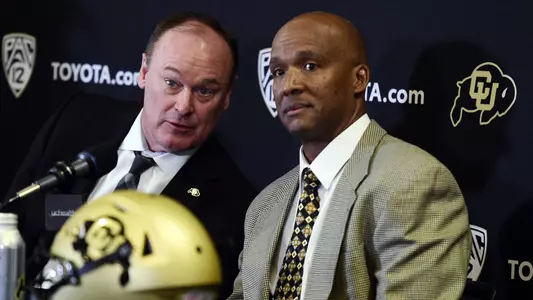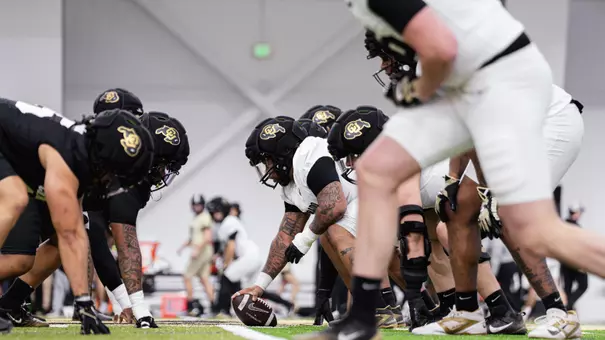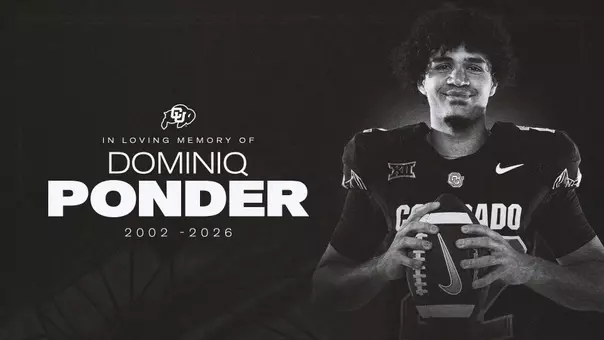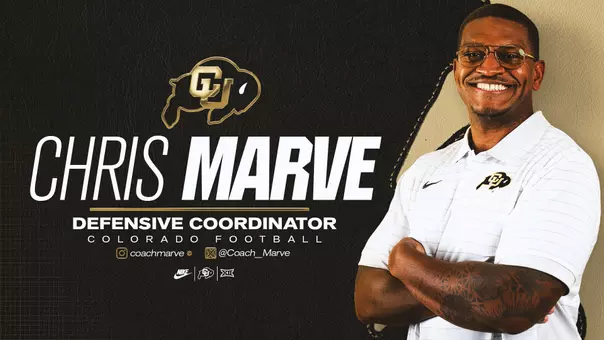Colorado University Athletics

CU's Student-Athlete Support Systems Were A Key For Dorrell
March 08, 2020 | Football, Neill Woelk, Psychological Health & Performance
BOULDER — When Karl Dorrell interviewed for the Colorado coaching job, he had all the right answers for Buffaloes Athletic Director Rick George's questions.
But Dorrell also had some questions for George, stemming from his first experience as a head coach at UCLA. There were some issues there that Dorrell wanted to make sure didn't exist if he took the job at Colorado — and George had all the right answers as well.
Not all of them involved football.
"We talked in the interview about some very specific things," Dorrell said. "It wasn't just the football piece. There were things from my experience that I didn't have when I was in this seat before. That was really important. We have those pieces in place here because Rick felt in recent history they were short in certain areas, and we've made those accommodations."
One of those areas that was a key piece to the puzzle for Dorrell was CU's strong Psychological Health and Performance Department. A firm believer that mental health is an important component to a student-athlete's overall well-being, Dorrell wanted to be sure CU offered that kind of support.
George was able to point out that CU has become a national leader in that area, earning recognition across the nation for its efforts in helping student-athletes maintain good health in every regard — mental and physical.
"The mental health aspect is a critical, critical piece with these young student athletes," Dorrell said. "Because they are bigger than average students in terms of size and athleticism, you think they are these big, mature grown men. But they are still shaping their mindset. That's what college is for. They are learning on and off the field. They're learning about real-life events and issues that are going to occur and the solutions ."
Since leaving UCLA in 2007, Dorrell has spent the vast majority of his time in the professional ranks. While the college game itself hasn't changed, the support systems and assistance provided student-athletes has undergone a dramatic transformation.
That assistance, Dorrell said, has become an integral — and very necessary — component of college athletics because of the issues student-athletes now deal with.
"It's very different than it was 15 or 20 years ago," Dorrell said. "Technology — their phones — has changed their world. It's how they communicate, what they believe in, and how they see themselves. When it comes to the good things they like about themselves, their successes, it's great. But when someone is speaking poorly about them and everyone is seeing it, it's a catastrophic event."
And the world that is familiar to most college students is magnified in the world of student-athletes, who see their performances scrutinized — and criticized — by thousands of people.
"They're under a lot of pressure and those devices can create a lot of negative energy about themselves," Dorrell said. "They have all these things pulling at them — football, school, socially — and it's magnified by technology."
When Dorrell quizzed George about CU's Psychological Health and Performance Department, he found it was an integral piece of CU's approach, one that George has championed — and significantly expanded — in his tenure at Colorado. George has steadily increased funding, support and personnel for the department, and it has become a model for other universities.
"It was huge," Dorrell said. "It's something I've dealt with and I understand that it's an important piece for every student-athlete. They need to know there's a resource for them."
There is no doubt a strong mental health program can help student-athletes' performance in competition and in the classroom. It's why Dorrell made it a priority to meet with every player on the roster as soon as possible after taking the job — and the conversation wasn't limited strictly to football.
"The coach has to build a relationship with the student-athlete and there has to be communication," he said. "Once they get comfortable communicating with you, they'll be more comfortable dealing with the next person and the next person. They'll be more expressive about their actions or their concerns or their emotions. It just takes one person."
That relationship, Dorrell said, is a critical piece of a coach's duties.
"It's not just a product on the field," he said. "You're trying to help shape young men to be great young men, to get this college experience. It can't be, 'School's a pain.' It has to be, 'School is going to help set me up to what I want to become and I'm using football as a catalyst to get there.'"
And that's something Dorrell will stress to the Buffs.
"I'm really trying to build that piece — making football be the catalyst for something," he said. "Don't let football define you. You're more than that. You're not going to do this forever. You're going to do other things. Let football be a catalyst for you to do these other things and be a success in whatever it is you do."
Contact: Neill.Woelk@Colorado.edu





